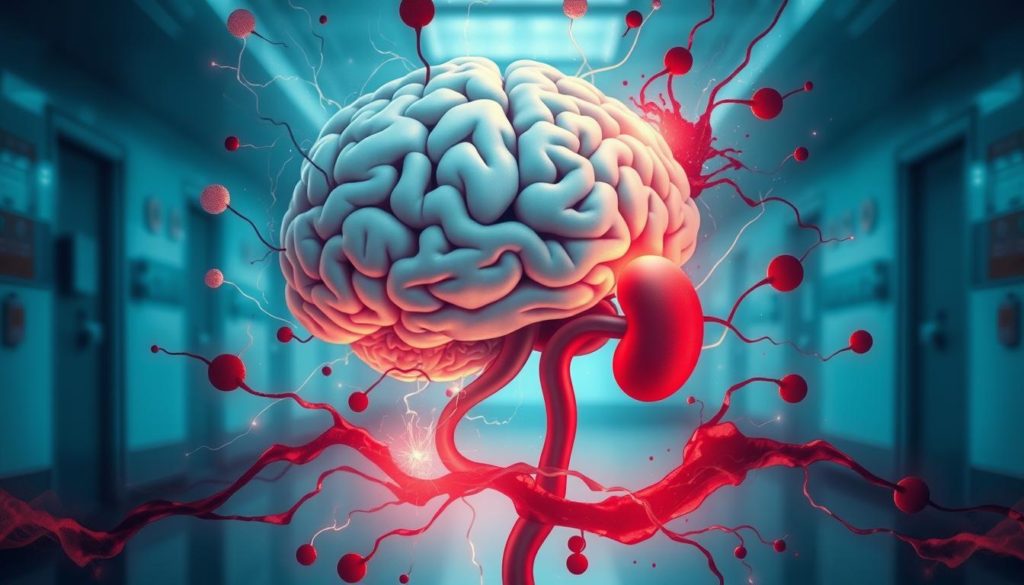Did you know up to half of elderly people see blood in their urine at some point? For those with Alzheimer’s, spotting blood in urine is key due to their complex needs. It helps to know the causes of this warning sign to enhance life for patients and caregivers.
Sometimes, hematuria doesn’t mean a big health scare. But with Alzheimer’s disease complications, it’s usually a sign of something like UTIs or injury. We’ll look into why this happens and how to help hematuria in Alzheimer’s patients.
Catching these signs early and getting help can change things for the better. Stick around as we share crucial info and steps for caregivers.
Understanding Blood in Urine (Hematuria)
Hematuria means there’s blood in the urine. It’s key for older folks and those with Alzheimer’s Disease. Knowing the signs and reasons behind hematuria helps in getting the right medical aid quickly. Hematuria divides into two main kinds.
Types of Hematuria: Gross vs. Microscopic
Hematuria comes in two forms:
- Gross Hematuria: You can see the blood in the urine with your own eyes. It’s simpler to spot because the urine looks pink, red, or cola-like.
- Microscopic Hematuria: This type needs a microscope to see. It often shows up in routine urine tests, something crucial for the elderly or those with Alzheimer’s and urine issues.

Common Causes in Elderly Patients
Older adults and those with Alzheimer’s Disease might find blood in their urine due to various reasons:
- Urinary Tract Infections (UTIs): Infections anywhere in the urinary system can create hematuria. Managing these is key for Alzheimer’s patients.
- Trauma: Hurt to the kidneys or bladder can cause visible blood in the urine.
- Prostate Issues: An enlarged prostate in older men can cause hematuria, among other urinary symptoms in Alzheimer’s.
- Kidney Stones: Stones can bring about intense pain and lead to hematuria.
- Cancer: Cancer in the kidney, bladder, or prostate might cause blood in the urine.
Also, some foods and medicines can change urine color. This might hide or mimic blood. So, getting the right diagnosis is critical. It ensures the best care and life quality for those with Alzheimer’s experiencing blood in urine.
The Link Between Alzheimer’s Disease and Hematuria
Exploring the connection between hematuria and Alzheimer’s is key. This is because Alzheimer’s patients often have urinary problems. These issues are due to the brain’s changes, which affect bladder control and overall health.
How Alzheimer’s Can Affect Urinary Symptoms
Alzheimer’s can majorly affect urinary symptoms. The brain’s decline makes bladder control hard. This can cause leaks or raise the risk of UTIs. Such urinary problems can make caring for patients harder, needing specific ways to handle blood in the urine.

Common Complications Leading to Hematuria
Alzheimer’s patients often face several complications that cause hematuria. Trouble with bladder control (incontinence) is common, which increases hygiene challenges and infection risks. Using catheters, getting infections often, and injuries from falls add to the chances of finding blood in urine.
Also, these patients may not express discomfort well, leading to untreated UTIs and other urinary problems. The connection between hematuria and Alzheimer’s is clear due to the high number of urinary issues. Watching and managing blood in the urine can lower these risks and better life quality. Seeing more confusion or upset in patients might mean a UTI is present. This requires quick doctor visits to stop symptoms from getting worse.
Common Causes of Blood in Urine with Alzheimer’s
Hematuria is a big concern for people with Alzheimer’s because of various reasons. Knowing these reasons helps manage Blood in Urine better. It also aids in effectively dealing with Urinary Symptoms tied to Alzheimer’s Disease.
Urinary Tract Infections (UTIs)
UTIs are a top reason for Hematuria in those with Alzheimer’s. They show up as fever and loss of bladder control. These contribute to worsening Urinary Symptoms in Alzheimer’s.
Injuries and Trauma
Falls or catheter use can hurt the back or pelvis, causing Blood in Urine. It’s key to handle those with Alzheimer’s carefully. This prevents such injuries.
Prostate Problems
For older men, prostate issues mean trouble fully emptying the bladder and might cause hematuria. These prostate troubles can lead to more urinary infections and symptoms in Alzheimer’s.
Kidney Stones and Other Obstructions
Kidney stones and blocks cause Blood in Urine for Alzheimer’s patients. They bring sharp pain and require quick doctor’s help to ease the symptoms.
Medications and Diet
Some drugs, like blood thinners, heighten the risk of hematuria. Also, eating beets or blackberries might look like blood in the urine. This makes figuring out real Hematuria from Alzheimer’s harder.
Symptoms to Watch for in Alzheimer’s Patients
Caregivers are crucial in Detecting Blood in Urine in Alzheimer’s Patients. They need to watch carefully for several signs. These include a burning feeling when urinating, needing to go more often, and changes in the color of urine. There can also be pain in the lower belly and sudden shifts in mood or behavior.
Alzheimer’s patients may not show usual symptoms of urinary problems. Along with the common signs, high fever, feeling sick, and pain in the lower back are crucial. Watching for slight changes in how they act or think is important. This helps spot problems early because they may not say when they’re in pain.
For Alzheimer’s Disease and Blood in Urine, caregivers should use a list to keep track of symptoms. This list should include:
- Burning sensation during urination
- Increased frequency or urgency of urination
- Changes in urine color
- Lower abdominal pain
- High fever
- Nausea
- Lower back pain
- Unexpected changes in behavior (increased confusion or agitation)
When to Seek Medical Help for Hematuria
It’s key to know when to seek medical help for blood in urine for Alzheimer’s patients. This is crucial for their health. If you see signs like high fever, severe pain, chills, or blood clots, act fast.
Emergency Symptoms
Some symptoms should make you seek help right away:
- High fever with chills
- Severe pain in the lower abdomen or back
- Visible blood clots in urine
- Struggling to empty the bladder
- Problems with a catheter if used
These signs may suggest serious health issues that need quick action.
Common Signs to Call a Doctor
Even if emergency signs are absent, seeing a doctor is wise. Watch for new swelling in legs or feet, a lasting cough, or a recent illness. Also look for changes like more confusion, agitation, or sudden mood changes paired with urinary signs. These are cues to get medical help.
Blood in Urine with Alzheimer’s might mean UTIs, injuries, or kidney issues. Quick help can manage these well.
To manage Blood in Urine with Alzheimer’s well, know these signs and act fast. Keep an eye on any odd or lasting symptoms. Always reach out to a healthcare provider when necessary.
Diagnostic Procedures for Blood in Urine
Identifying blood in urine in Alzheimer’s patients requires several tests. These tests help find the root cause of urinary symptoms in Alzheimer’s disease.
Urinalysis and Imaging Tests
A urinalysis is often the first step to check for blood in urine. It shows the presence of red blood cells and other issues. Imaging tests like ultrasounds or CT scans give a closer look at the urinary tract. They help identify problems such as kidney stones or tumors.
Role of Medical History and Physical Examination
Gathering a patient’s medical history is key in detecting blood in urine in Alzheimer’s patients. It includes details on Alzheimer’s progression, medications, diet, and past urinary issues. Physical exams help spot pain or discomfort Alzheimer’s patients may not express. Catching these signs early improves treatment and symptom management.
Managing Blood in Urine at Home
When managing blood in urine with Alzheimer’s, there are home strategies that help. These strategies ease symptoms and make the patient more comfortable.
Keeping the patient hydrated is very important in managing blood in urine. It helps to encourage loved ones to drink lots of fluids. This can dilute the urine and might help clear up any infections.
Caregivers need to make sure that the person stays hydrated all day. This is a big part of home care.
Pain relief is also key in at-home treatment. You should give over-the-counter pain relievers as the doctor suggests. Always talk to the doctor about which medicine is safe, especially with other health issues.
It’s vital to keep the genital area clean to avoid more irritation or infections. Regular washing and drying gently are important for Alzheimer’s patients managing blood in urine.
If the person uses a catheter, proper management is crucial. Make sure catheters are in the right place, not blocked, and cleaned as doctors recommend. This helps prevent problems that lead to blood in urine.
Dietary changes can make a big impact too. Try to lessen the patient’s intake of kidney-stone-causing foods like spinach and nuts. It may help to talk to a dietitian for a balanced diet plan.
In the end, caregivers need to protect themselves by wearing gloves during bathing and toilet help. Good hygiene practices are key to keep both the caregiver and patient safe from infection.
| Home Care Strategies | Key Actions |
|---|---|
| Hydration | Encourage fluid intake |
| Pain Relief | Use doctor-approved medication |
| Genital Hygiene | Regular washing and drying |
| Catheter Management | Ensure proper placement and clean |
| Dietary Changes | Reduce oxalate-rich foods |
| Caregiver Safety | Wear gloves and maintain hygiene |
Preventive Measures for Urinary Tract Health
It’s very important to keep the urinary tract healthy, especially for those with Alzheimer’s Disease. This can lower the chance of hematuria and more issues. Taking steps early can stop problems from starting.
Hydration and Diet
Staying hydrated is a key way to prevent urinary tract issues. Drinking plenty of water washes away harmful bacteria. Adding cranberry juice or supplements, with a doctor’s advice, helps too. Cranberries have special stuff that stops bacteria from sticking inside the urinary system.
Eating fruits, veggies, and foods high in fiber helps keep the urinary system working right. A diet with less salt and more antioxidants is good too. This is especially important for those with Alzheimer’s Disease and concerns about blood in urine.
Personal Hygiene Tips
Good hygiene is very important, especially for someone with Alzheimer’s who might find daily care challenging. Making sure the genital area is clean and dry is key. Always wiping from front to back stops bacteria from spreading.
Changing incontinence products often and using vaginal estrogen creams, if needed, can lower UTI risks. Having a regular bathroom routine and proper care for catheters, if used, are also good steps. These actions greatly reduce UTI and hematuria chances, helping those with Alzheimer’s Disease feel better.
FAQ
What are the common causes of blood in urine in Alzheimer’s patients?
For Alzheimer’s patients, blood in the urine may be caused by urinary tract infections (UTIs), injuries, or prostate issues. Other causes include kidney stones, and cancers of the bladder, kidney, or prostate. Medications can also lead to this issue.
How can Alzheimer’s disease exacerbate urinary symptoms?
Alzheimer’s affects the brain’s ability to control the bladder. This increases UTI risks. Patients may face incontinence and struggle to express discomfort. The use of catheters and higher injury risks also contribute to these problems.
Are there different types of hematuria?
Yes. There are two types of hematuria: gross hematuria makes urine visibly bloody. Microscopic hematuria is blood that only a microscope can find.
What symptoms should caregivers watch for in Alzheimer’s patients?
Caregivers must look out for burning sensations during urination, or changes in urination habits. Pay attention to urine color changes and lower abdomen pain. Also, watch for more confusion or agitation as these can signal a problem.
When should medical help be sought for hematuria in Alzheimer’s patients?
Seek medical care for high fever, major pain, chills, blood clots in urine, or urinary issues. Even without these signs, contact a doctor for new swelling, cough, recent illnesses, or changes in behavior related to urinary issues.
What diagnostic procedures are used for detecting blood in urine in Alzheimer’s patients?
Doctors may use urinalysis, ultrasounds, or CT scans to find the cause of hematuria. Knowing the patient’s medical and Alzheimer’s history, medicines, diet, and UTI background helps in diagnosing.
How can blood in the urine be managed at home for Alzheimer’s patients?
To manage at home, increase fluids, provide pain relief as prescribed, and maintain cleanliness. Care for catheters properly, adjust diet and medications with a doctor’s advice. Good hygiene and scheduled toileting are key for caregivers.
What preventive measures can be taken to maintain urinary tract health in Alzheimer’s patients?
Preventive steps include staying hydrated, eating a balanced diet that may include cranberry products after medical advice, and ensuring cleanliness. Regular bathroom visits and proper catheter and vaginal estrogen use can lower UTI risks.
What dietary factors can influence hematuria in Alzheimer’s patients?
Certain foods, like beets or blackberries, might make urine look bloody. Foods that lead to kidney stones can also cause blood in urine. A healthcare provider should guide diet choices.


